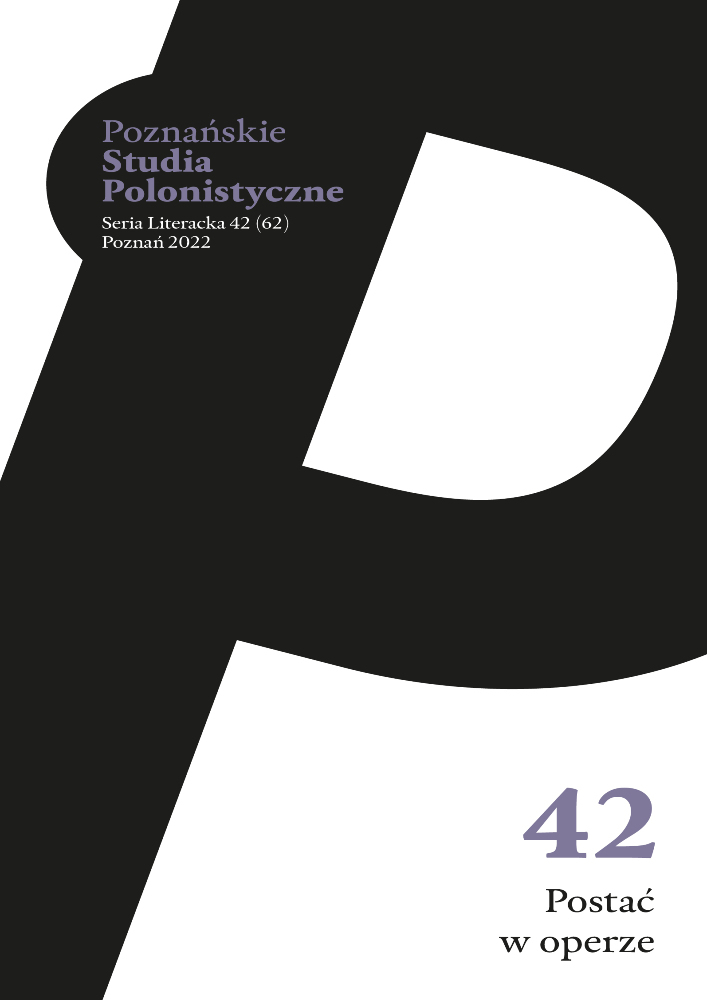Abstract
The article presents the characteristics of the romantic irony employed in Alexander Pushkin’s digressive poem Eugene Onegin and Pyotr Tchaikovsky’s opera titled alike. The analysis of selected fragments of the libretto which were based on the verses constituting the digressive (rather than storytelling) layer of Pushkin’s work allow one to conclude that the operatic version of Onegin expresses exactly the same kind of romantic irony which was used by the romantic poet. The authors of the libretto achieved something typical of Pushkin’s irony – a flow of the border between illusion and disillusion and an effortless crossing of the dialectic borders of time and space. They did so by multiplying and splitting into layers the “I” of the main character which functions both in the dramatic plane and beyond it, taking over the functions which in Pushkin’s text were performed by the narrator.
References
Christensen Jerome (1993), Lord Byron’s Strength: Romantic Writingand Commercial Society, Johns Hopkins University Press, Baltimore.
Czajkowski Modest, Szyłowski Konstantin (1948), Jewgienij Oniegin,[libretto w partyturze], w: Piotr Iljicz Czajkowskij, Połnojesobranije soczinienij, t. 4: Opiernoje tworczestwo. Jewgienij Oniegin.Partitura, red. Iwan Szyszow, Gosudarstwiennoje MuzykalnojeIzdatielstwo, Moskwa.
Golianek Ryszard Daniel (2020), Reżyserski teatr operowy XXI wieku. Nurty i twórcy, Wydawnictwo Akademii Muzycznej im. Grażyny i Kiejstuta Bacewiczów, Łódź.
Greenleaf Monika (1994), The Sense of Not Ending. Romantic Irony in „Eugene Onegin”, w: tejże, Pushkin and Romantic Fashion. Fragment, Elegy, Orient, Irony, Stanford University Press, Stanford, s. 205–286.
Hamerski Wojciech (2018), Ironie romantyczne, IBL PAN, Warszawa.
Łotman Jurij (1998), Rosja i znaki. Kultura szlachecka w wieku XVIII i na początku XIX wieku, przekład i posłowie Bogusław Żyłko, słowo/obraz terytoria, Gdańsk.
Łużny Ryszard (1993), Wstęp, w: Aleksander Puszkin, Eugeniusz Oniegin. Romans wierszem, przeł. Adam Ważyk, wstępem i przypisami opatrzył Ryszard Łużny, Ossolineum, Wrocław, s. V–CXVI.
Pomorski Adam (1987), Sceptyk w piekle, „Literatura na Świecie”, nr 3, s. 231–251.
Puchalska Iwona (2013), Improwizacja poetycka w kulturze polskiej XIX wieku na tle europejskim, Wydawnictwo Uniwersytetu Jagiellońskiego, Kraków.
Puszkin Aleksander (1993), Eugeniusz Oniegin. Romans wierszem,przeł. Adam Ważyk, wstępem i przypisami opatrzył Ryszard Łużny, Ossolineum, Wrocław.
Puszkin Aleksandr Siergiejewicz (1983), Jewgienij Oniegin. Roman w stichach, Sowietskaja Rossija, Moskwa.
Stabler Jane (2004), Byron, Poetics and History, Cambridge University Press, Cambridge.
Szturc Włodzimierz (1994), „Don Juan” Byrona i „Beniowski” Słowackiego. Ironia jako principium poematu dygresyjnego, w: tegoż, Osiem szkiców o ironii, Universitas, Kraków, s. 95–107.
Wojda Aleksandra (2016), Opera jako fragment: o literackiej karierze „Freischütza” (Mickiewicz, Heine, Gautier), „Ruch Literacki”, z. 5 (338), s. 527–546, [dostęp: 12 sierpnia 2022], https://tinyurl.com/mrx5xfx8.
Zelech Władysław (1991), Uwagi o przekładach „Eugeniusza Oniegina” A. Puszkina na język polski (podobieństwa i różnice), „Rocznik Naukowo-Dydaktyczny. Prace Językoznawcze”, z. 6 (137), s. 145–153.
Żurowski Maciej (1958), „Pani Bovary” i rozwój powieści nowoczesnej, „Przegląd Humanistyczny”, nr 4, s. 17–44.
License
Authors
Authors of texts accepted for publication in „Poznańskie Studia Polonistyczne. Seria Literacka” are required to complete, sign and return to the editor's office the Agreement for granting a royalty-free license to works with a commitment to grant a CC sub-license.
Under the agreement, the authors of texts published in „Poznańskie Studia Polonistyczne. Seria Literacka” grant the Adam Mickiewicz University in Poznań a non-exclusive, royalty-free license and authorize the use of Attribution-NoDerivatives 4.0 International (CC BY-ND 4.0)Creative Commons sub-license.
The authors retain the right to continue the free disposal of the work.
Users
Interested Internet users are entitled to use works published in „Poznańskie Studia Polonistyczne. Seria Literacka” since 2016, for non-commercial purposes only, under the following conditions:
- attribution - obligation to provide, together with the distributed work, information about the authorship, title, source (link to the original work, DOI) and the license itself.
- no derivatives - the work must be preserved in its original form, without the author's consent it is not possible to distribute the modified work, such as translations, publications, etc.
Copyrights are reserved for all texts published before 2016.
Miscellaneous
Adam Mickiewicz University in Poznań retains the right to magazines as a whole (layout, graphic form, title, cover design, logo etc.).

